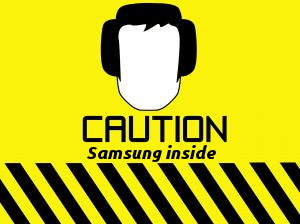

SAMSUNG has become the biggest seller of Android devices. That's not necessarily good news because Samsung pays Microsoft for it, so it helps legitimise extortion. We have a "Ballnux" section in our daily links for this reason.
"Hardware suitable for Linux is available from companies that don't pay Microsoft for it."Rumours suggest that Google will shift Nexus 10 production away from Samsung [1], which is promoting gimmicks [2] with the "Galaxy" brand [3] (synonymous with its phones). Samsung tried to take over Cyanogen development through hiring of developers (who have left to create their own company [4]) and it is now trying to take over MeeGo (Nokia/Intel) [5].
What's noteworthy is that Samsung goes everywhere but Windows. Being a Windows shop does not pay off anymore. But Samsung pays Microsoft for Linux and this is a serious issue. Hardware suitable for Linux is available from companies that don't pay Microsoft for it. With Tegra, for example, Nvidia has become its own powerhouse [4] that destroys Microsoft's monopoly [5]. Nvidia has its own tablet now. Torvalds has given Nvidia a finger pointing up, but it was not his thumb, so companies like ASUS, Motorola, and even little Archos are worth prioritising when it comes to Android. ⬆
Related/contextual items from the news:
We have already received second iteration of the Nexus 7 and now its turn for Nexus 10 to show up. Samsung manufactured the current Nexus 10, but it seems Asus has taken over as the maker of the next version of Nexus 10.
Samsung is pulling out all the stops for its Samsung Galaxy Gear, aka Smart Watch. That's nice, but the watch is yesterday's format.
Samsung released their new mid-range phone for the Indian market, the Galaxy Trend, for a price of Rs. 8,700. The phone is listed on the official Samsung site for India, but no information about the delivery is currently available. Yet interestingly, online retailers like Flipkart and Snapdeal are also offering it, but with a delivery time of 3 days and at a discounted price of Rs. 8,490 to boot!
Cyanogen, makers of popular software based on Android that extends the abilities of smartphones, is making a bid for the mainstream. The four-year-old company, which began as a one-person side project, said today that it has raised $7 million from Benchmark Capital and Redpoint Ventures. The goal is to vault past Blackberry and Windows Phone to become the third-most popular mobile operating system, after traditional Android and iOS. And the company is already closer than you might think.
Samsung still has no Tizen phone, but there are big plans for bigger devices.
Unlike Nvidia's Project Shield handheld, which came out earlier this summer, the Tegra Note won't be sold directly by Nvidia. Instead, it will be offered by some of the firms who currently sell Nvidia graphics cards—EVGA and PNY in North America and EVGA, Oysters, and Zotac in Europe, to name a few. The device will be released worldwide "in the next few months," Nvidia says.
Developers have been trying for years to make Linux a global platform and to make it available to the masses and not just a select few, but Linux has now become the future of gaming in a surprising manner.